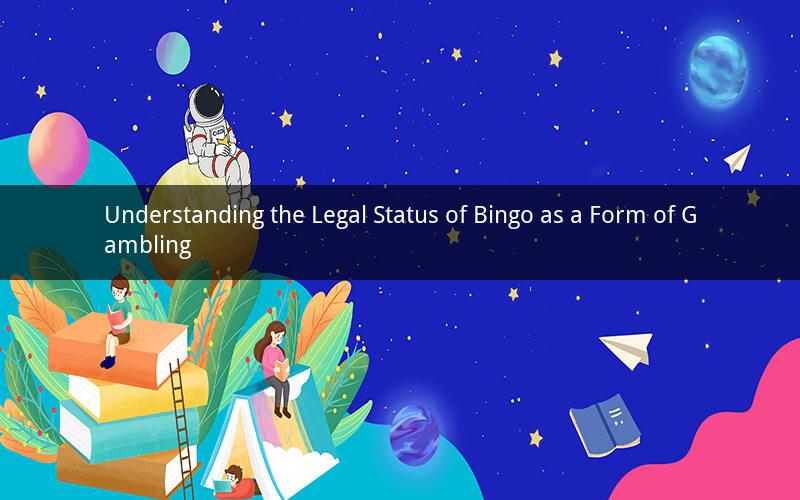
Bingo, a game of chance that has been beloved by players for generations, often sparks debate regarding its classification as a form of gambling. This article delves into the legal aspects of bingo, examining whether it is considered gambling by law and the factors that contribute to this classification.
1. What is Bingo?
Bingo is a game of chance that involves players marking numbers on their cards as they are called out by a bingo caller. The objective is to be the first to complete a pattern on their card, usually in a diagonal, horizontal, or vertical line. The game has various versions, including 75-ball, 90-ball, and 5-line bingo.
2. The Legal Definition of Gambling
To determine whether bingo is considered gambling by law, it is essential to understand the legal definition of gambling. In many jurisdictions, gambling is defined as an activity involving chance, consideration, and prize. The presence of all three elements is crucial in determining whether an activity qualifies as gambling.
3. Bingo as a Game of Chance
Bingo is primarily a game of chance because the outcome depends on random events. Players have no control over the numbers called, and the likelihood of winning is based on the luck of the draw. This element of chance aligns with the legal definition of gambling.
4. Consideration in Bingo
Consideration refers to something of value that is exchanged between the players and the bingo operator. In the case of bingo, consideration can be in the form of money, tickets, or other valuable items. Players purchase bingo cards, which entitle them to participate in the game and potentially win a prize. This exchange of consideration satisfies the second element of the legal definition of gambling.
5. Prize in Bingo
The third element of the legal definition of gambling is the presence of a prize. Bingo games typically offer cash or other valuable prizes to the winners. These prizes serve as an incentive for players to participate and contribute to the gambling nature of the game.
6. The Legal Status of Bingo
The legal status of bingo as a form of gambling varies depending on the jurisdiction. In some countries and regions, bingo is explicitly classified as gambling, while in others, it is not. Here are a few examples:
a. United States: In the United States, the legality of bingo varies by state. Some states classify bingo as gambling, while others consider it a form of entertainment. The distinction often depends on whether the bingo game is conducted for profit or for charitable purposes.
b. United Kingdom: In the United Kingdom, bingo is not considered gambling. The Gambling Act of 2005 explicitly excludes bingo from the definition of gambling, provided it is conducted for charitable purposes or by a registered club.
c. Australia: In Australia, the legality of bingo is determined by state and territory laws. In some areas, bingo is classified as gambling, while in others, it is considered a form of entertainment.
7. Factors Influencing the Legal Status of Bingo
Several factors can influence the legal status of bingo as a form of gambling. These include:
a. The purpose of the bingo game: Bingo conducted for charitable purposes or by a registered club may have a different legal status compared to bingo conducted for profit.
b. The presence of an organized gambling element: Bingo games that involve an organized gambling element, such as betting on the outcome, may be considered gambling.
c. The nature of the prize: Bingo games with significant cash prizes may be more likely to be classified as gambling compared to those with smaller, non-cash prizes.
8. Conclusion
In conclusion, whether bingo is considered gambling by law depends on the jurisdiction and the specific circumstances of the bingo game. While bingo is primarily a game of chance, the presence of consideration and prize makes it subject to the legal definition of gambling. Understanding the legal status of bingo is crucial for operators, players, and authorities to ensure compliance with applicable laws and regulations.
Questions and Answers:
1. Q: Is bingo always considered gambling?
A: No, the legal status of bingo as a form of gambling varies depending on the jurisdiction and the specific circumstances of the game.
2. Q: Can bingo be conducted for charitable purposes without being classified as gambling?
A: Yes, bingo conducted for charitable purposes or by a registered club may not be considered gambling, provided it meets the legal requirements of the jurisdiction.
3. Q: What is the main difference between bingo and gambling?
A: The main difference lies in the presence of consideration and prize. Bingo involves consideration (in the form of purchased cards) and a prize (in the form of cash or other valuable items), which aligns with the legal definition of gambling.
4. Q: Can a bingo game be conducted without a prize?
A: Yes, bingo games can be conducted without a prize. However, the absence of a prize may affect the game's classification as gambling, depending on the jurisdiction.
5. Q: Is online bingo considered gambling?
A: The legal status of online bingo as a form of gambling depends on the jurisdiction. In some countries, online bingo is classified as gambling, while in others, it is not. It is essential to consult the relevant laws and regulations of the jurisdiction in question.